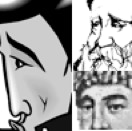
RASHI, RAMBAM and RAMALAMADINGDONG
A Quizbook of Jewish Trivia Facts & Fun

A Quizbook of Jewish Trivia Facts & Fun
President Joe Biden nominated Ketanji Brown Jackson to replace retiring Justice Stephen Breyer on the Supreme Court. The Supreme Court has weighed in on many cases over the years which have directly affected the Jewish community, including Greece v. Galloway (which upheld the right of governments to open public meetings with a religious prayer) and Shaare Tefila Congregation v. Cobb (wherein the Court ruled that a synagogue that was desecrated with anti-Semitic graffiti could sue the perpetrator for “racially discriminatory interference with property rights.” A lower court had ruled that this so-called “white-on-white” crime was not a form of racial discrimination). In 1954, police in Springfield, Massachusetts, arrested Howard Chernock, owner of the Crown Kosher Super Market, following purchases made by the police at the store on three Sundays in violation of the state’s Blue Laws. The Blue Laws, first enacted in 1653, stated that “whoever, on the Lord’s day, keeps open his shop, warehouse or workhouse, or does any manner of labor, business or work, except those of necessity or charity, shall be punished by a fine of fifty dollars.” The Massachusetts law did allow the market to open on Sunday, but only until 10:00am. Chernock was fined, but in response Chernock and some of his customers sued Raymond P. Gallagher, the Springfield police chief, claiming that the law violated the Establishment Clause of the First Amendment (basically, that it violated their religious rights). The District Court ruled in Chernock’s favor, and Chief Gallagher appealed the case to the Supreme Court. What was the result of that appeal, in the case of Gallagher v. Crown Kosher Super Market of Massachusetts?

Official portrait of Judge Ketanji Brown Jackson by H2rty is licensed under CC BY-SA 4.0 via Wikimedia Commons
A. The Supreme Court upheld the District Court ruling in a 6-3 decision, noting that though the State might legally be able to require a day of no commercial operations, the Blue Laws clearly were based on the Christian view of Sunday as the Lord’s day of rest rather than a non-religious view of the best interests of the State.
B. The Supreme Court refused to hear the case. While the Court does not announce why it chooses not to take up any particular case, it was speculated that the Court saw absolutely no flaw in the ruling of the District Court, so left their ruling in place that the Blue Laws were unconstitutional.
C. The Supreme Court overturned the District Court ruling, stating in a 7-2 decision that, despite the original religious basis for the Blue Laws, these restrictions no longer had religious intent, and therefore the state had a right to declare a commercial day of rest.
D. The Supreme Court decided against Chernock and his customers, noting that since the Massachusetts law allowed him to operate until 10:00am, it was not valid to claim that there was a religious preference given to Christian theology. As a result, many states whose Blue Laws allowed no opening hours on Sunday changed their laws to allow very limited operating hours, but this ultimately led to hours being extended more and more, eventually leading to the revocation of most Blue Laws.
E. The nine member Supreme Court ruled 8-2 to uphold the Blue Laws, with the seven non-Jewish justices (Earl Warren, Hugo Black, Stanley Forman Reed, William O. Douglas, Robert H. Jackson, Harold Hitz Burton, and Tom C. Clark) all voting in favor, while the two Jewish members of the court (Felix Frankfurter and Arthur Goldberg), voted 1 in favor, 2 against, upholding the classic model of “2 Jews, 3 opinions.”
✡ ✡ ✡ ✡ ✡ ✡ ✡ ✡ ✡
© 2025 MMJZ Services, Inc.